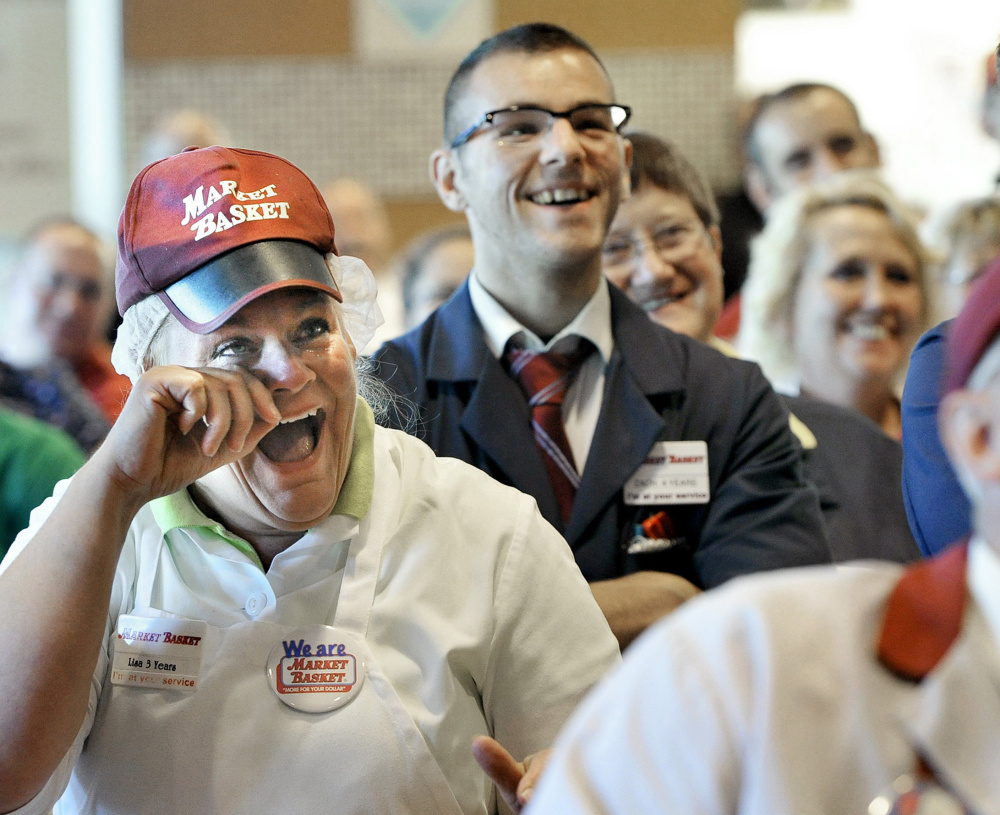There is a moment late in “We the People – The Market Basket Effect,” a documentary about the fascinating 2014 public battle over the future of the Demoulas family’s supermarket chain, when the camera pans over one of the stores while a man’s voice says, “I think people drive by Market Basket now and see not just a grocery store, at least for a little while longer I think, they are going to see a movement.”
He’s got a point. Living in Maine, where there is only one Market Basket and it is more than an hour from my home, my whole awareness of this East Coast chain (75 stores in three states) business began in the summer of 2014 when reports of the dwindling amount of groceries available at the Biddeford store and the growing ire of Market Basket employees and regular customers began appearing in the pages of this newspaper.
The employees were upset over the ouster of Chief Executive Arthur T. Demoulas, who had carried on a corporate culture begun by his grandfather that included profit sharing, decent wages (well over minimum wage) and the kinds of retirement plans that could actually pay for retirements.
Loyal customers – and there were many, because Market Basket was already known for selling good products at better prices – sympathized with employees and the man that had given them good deals. They joined in and began boycotting the place. Vendors, like seafood purveyors Boston Sword & Tuna, stopped supplying Market Basket. According to the documentary, directed by Tommy Reid and written by Jeff Pinilla (who has fairly extensive, if unfamiliar, credits), the business was losing about $3 million a day during the six-week strike and boycott.
Arthur T. Demoulas had been fired by his cousin Arthur S. Demoulas, whose branch of the family had born a generation-long grudge against the Arthur T. side of the family for his father’s financial dealings. The grudge had been settled in court, with the majority ownership going to Arthur S. et al, but never apparently in the court of family matters. The Arthur S. side of the family wanted to see higher profit margins and, if popular wisdom is to be believed, didn’t care about keeping up the kind of loving corporate culture that had Arthur T. rushing to the bedside of a deli manager with cancer (true story) to assure him that his family would be taken care of, no matter what. Nor was the Arthur S. side of the family happy when Arthur T. announced that every customer would get a 4 percent discount on their bill (with the exception of dairy, tobacco and alcohol purchases) throughout 2014.
The improbable victory of the employees, representing the little guy everywhere, over Arthur S., representing corporate greed everywhere, produced the kind of unintended but off-the-charts success publicity-wise that made me feel fond of the place. It’s a great story, as Boston Globe business columnist Shirley Leung says in the film, like a “Greek tragedy”: Greek immigrants arrive in Lowell, Massachusetts, build a popular local business, and get big on an ethic of hard work and customer service. Then, two generations later, the cousins are at each other’s throats. This material is too good to completely bungle in a documentary, although “We the People” includes some ill-advised moments.
The worst is a scene where shoppers return to a newly stocked Market Basket, giddily pushing their carts in slow motion while a gospel version of “America the Beautiful” plays. It’s too much.
Then there’s that voiceover. It’s not Michael Chiklis, a Lowell native and television star (“The Shield”) who narrates the film. Nor does it sound like journalist Casey Ross, who covered the legal case between the Demoulases for the Boston Globe and is the last figure to appear on screen before the musing begins. It seems instead to be the voice of ABC News journalist Jay Schadler, a correspondent on “Primetime,” finishing the thought he was having before Ross popped up on the screen. That’s sloppy editing.
It’s unfortunate, too, because Schadler’s phrasing, that a passer-by might see a movement, rather than a grocery store, “at least for a little while longer,” is a thought worth probing. How long will the customer goodwill for Market Basket, which boosted revenue in 2015, last? Is it a wake-up call to corporate America or a blip?
The film is far too reliant on the voices of journalists: two from the Globe, one from the Lowell Sun (who also wrote a book about Market Basket), Schadler, and a second television personality, Fox Business News anchor Trish Regan. With all due respect to my media brethren, less analysis from those who covered the story as it unfolded and more from the actual participants would make this a stronger film. As would interviews with the Demoulas family.
George Demoulas, the author of a memoir about growing up as an illegitimate Demoulas, speaks on the record but at a considerable remove, and when Arthur T. is finally interviewed by the team, clearly on the fly, he is polite but appears to be close to oblivious as to who they are and what they’re doing.
That’s not to say there aren’t some good voices, including a Market Basket store general manager and a priest from a Greek Orthodox church in Lowell. Former Massachusetts congressman Marty Meehan and New Hampshire Gov. Maggie Hassan speak to the cultural and economic importance of Market Basket.
Ted Leonsis, the owner of the Washington Wizards and Capitals, weighs in on the populist triumph by the Market Basket employees.
“I said, ‘This is our Arab Spring,’ ” Leonsis says.
The expertise that led him to make such a grandiose comparison? He grew up in Lowell. He’s also a producer of the film. Which is probably the only reason that line didn’t end up on the cutting room floor.
Send questions/comments to the editors.



